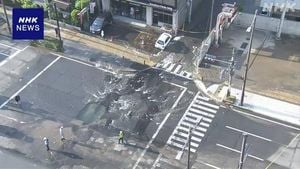On March 31, 2025, a crucial meeting took place at the Thai government headquarters, where Prime Minister Ms. Phaetongtarn Shinawatra led discussions on improving disaster warning systems, particularly following the recent earthquake that struck on March 28. The meeting, held at the Green Room of the Thai Koo Fah Building, gathered key officials including Deputy Prime Minister and Minister of Interior Anutin Charnvirakul, Deputy Minister of Digital Economy and Society Prasert Chanthararuangthong, and various heads of departments related to disaster management and telecommunications.
During the meeting, Prime Minister Shinawatra expressed her concerns regarding the SMS alerts sent during the earthquake, highlighting two main issues: the slow processing of the alert messages and delays in their transmission. "When an earthquake occurs, the warning should be dispatched within five minutes," she emphasized, underscoring the importance of timely communication to prevent public panic.
In response to the identified shortcomings, the Disaster Prevention and Mitigation Department (DPD) was tasked with developing a new operational system for disaster alerts, in accordance with the Disaster Prevention and Mitigation Act of 2007. This system aims to establish a clear timeline for the dispatch of messages in case of emergencies, ensuring that the public receives prompt and accurate information.
Telecommunications providers including NT, TRUE, and AIS reassured the Prime Minister that they are working on effective communication strategies, which will serve as backup systems until the Cell Broadcast system is fully operational. This new system is expected to enhance the efficiency of disaster alerts significantly.
In addition to the immediate concerns regarding earthquake alerts, the Prime Minister also instructed relevant agencies to develop comprehensive disaster response plans. These plans will categorize threats into three main types: natural disasters, cyber threats, and human-made disasters such as fires or terrorist attacks. Each category will have tailored warning systems based on the severity of the situation.
As part of the meeting's outcomes, the Ministry of Interior was directed to clarify the workflow for disaster response, ensuring that all agencies involved have a mutual understanding of their roles before and after the implementation of the Cell Broadcast system. The DPD was also instructed to coordinate with the Meteorological Department and the National Broadcasting and Telecommunications Commission (NBTC) to ensure that warning messages are clear and effective.
Furthermore, the Department of Public Works and Town & Country Planning was urged to expedite regulations for inspecting high-rise buildings to meet safety standards. This step is part of a broader initiative to enhance public safety and preparedness for future emergencies.
In a related legislative context, the Thai Parliament was also active on the same day, with discussions surrounding the Entertainment Complex Bill led by Mr. Wisutthi Yankeun, a member of the Pheu Thai Party. He announced that the bill will be presented for consideration in the parliamentary session scheduled for April 9. This legislation aims to regulate entertainment complexes, including provisions for limited gambling activities, which has sparked considerable public debate.
Mr. Yankeun expressed confidence that the discussions will be thorough and transparent, allowing both government and opposition members to voice their opinions. He acknowledged the concerns raised by certain groups, particularly regarding the potential for money laundering and the impact on local communities. However, he reassured that the government is committed to ensuring that any entertainment complex will not operate as a free-for-all gambling venue.
"If we are going to make decisions, we need to be thorough and considerate," Mr. Yankeun stated. He emphasized the necessity of finding funding to support various social programs, including increased financial support for the elderly and disabled. He pointed out that the government must explore all avenues for revenue generation, including the proposed entertainment complexes, which could contribute to the national budget.
As the discussions on the Entertainment Complex Bill continue, Mr. Yankeun noted that there is a need for clarity regarding the regulations and that any implementation will be gradual. He also addressed the concerns of those opposing the bill, particularly from the Muslim community, assuring that their voices will be heard and considered in the legislative process.
Both the disaster management initiatives and the entertainment legislation reflect the Thai government's proactive approach in addressing pressing issues facing the nation. While the earthquake alert system aims to safeguard citizens during natural disasters, the Entertainment Complex Bill seeks to balance economic growth with social responsibility.
As the government moves forward with these initiatives, the effectiveness of communication and public safety measures will be closely monitored, with the aim of fostering a safer and more informed society. The upcoming parliamentary sessions will be critical in determining the future of both the disaster response framework and the entertainment industry regulations in Thailand.






